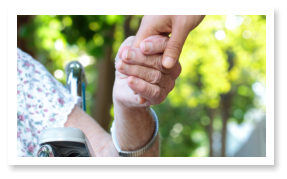| Apnea | It is the temporary absence, or cessation, of breathing. |
| Activities of Daily Living | A listing of common tasks performed on a daily basis like bathing, dressing, eating,etc. You may have heard these referred to as “ADLs.” |
| Ambulatory | It describes a person’s ability to walk. |
| Bereavement | Describes the period after loss. |
| Durable Medical Equipment | Equipment that is necessary because of a medical condition and is appropriate for use in the home like a wheelchair, walker, or bedside commode |
| Family | Relatives or other persons who are of significant importance to the patient; they need not be blood relatives. |
| Grief | The intense emotion felt when one is deprived of something or someone he/she loved. A highly personal response to loss and, also, a process whereby one works through the pain of loss. It is a necessary part of bereavement. |
| Geri-Chair | A wheelchair that cannot be self-propelled and has a high reclining back, foot ledge, and a removable dining tray. |
| Incontinence | A person’s inability to control the passage of his/her urine and/or feces. |
| Informed Consent | A full understanding by a competent person of the benefits and risks of a particular medical intervention or set of interventions. Prior to admission to hospice care, the patient/family must sign an informed consent agreement that states they understand the nature and scope of hospice care. |
| Interdisciplinary Team | A coordinated team of a nurse, social worker, certified nurse aide, chaplain, volunteer, physician, patient, family, and/or personal care provider, who collaborate to assure that the patient/family’s needs and wishes are met. |
| Medical Director | A fully licensed Physician who is charged with the responsibility of acting as a consultant to the Interdisciplinary Team and may also act as a liaison with attending physicians or other community physicians. |
| Medi-Cal | A program in the United States, jointly funded by the states and the federal government, which reimburses medical practitioners for providing care to qualifying people who cannot finance their own medical expenses. |
| Medicare | A program under the U.S. Social Security Administration that reimburses hospitals and physicians for medical care provided to qualifying people who are over 65 years old or disabled. |
| Mourning | The public expression of one’s loss which generally occurs from the news of the death of a loved one to the time of interment. |
| On-Call Staff | The nurse, social worker/chaplain, and administrator who are available after the hours of 8 and 5 and on weekends and holidays to assure the needs of the patient and family are met at all times. |
| Palliation | The aggressive treatment of symptoms related to an illness or disease process. These symptoms can be physical, emotional, spiritual, or social in nature. The goal of palliation is comfort, not cure. |
| Plan of Care | A document that outlines in detail the goals and interventions of care provided to a patient and family related to the problems or concerns they express. Patients and families are encouraged to participate in establishing these goals and identifying interventions that can help in meeting them. |
| Primary Caregiver | The person designated by the patient to provide primary emotional and physical support and is available when the patient needs him/her. This person may be an individual who has personal significance to the patient but no blood or legal relationship such as a neighbor, friend, or other person. |
| Prognosis | The forecast of a disease or illness. |
| Respite | A short interval of rest or relief. |
| Skilled Nursing Facility | A facility certified by Medicare and/or Medi-Cal that offers custodial and skilled care for persons whose physical and/or metal limitations requires 24 hour supervision. Expenses through Medicare have very limited coverage. Medi-Cal will cover costs for qualifying low-income individuals. |
| Support Group | A gathering of people with a common experience where one can share one’s thoughts, feelings and concerns and receive information and support from other group members or the facilitator. |
| Terminal Disease | An illness for which treatment directed toward cure or control of the disease process is no longer possible or effective. |
| Vital Signs | Temperature, pulse, respiration and blood pressure. |

